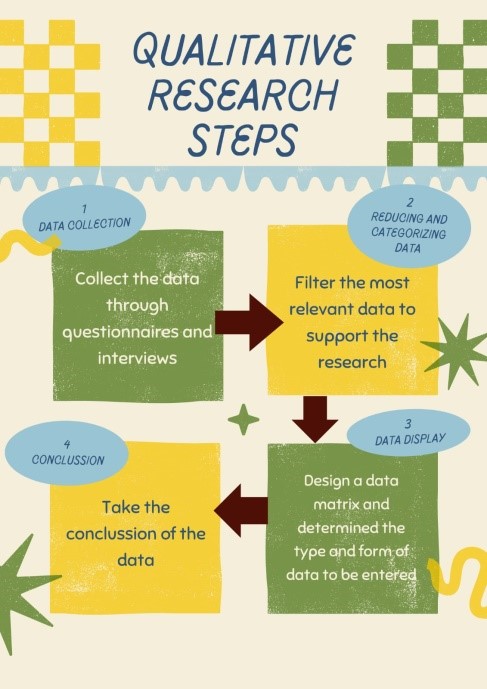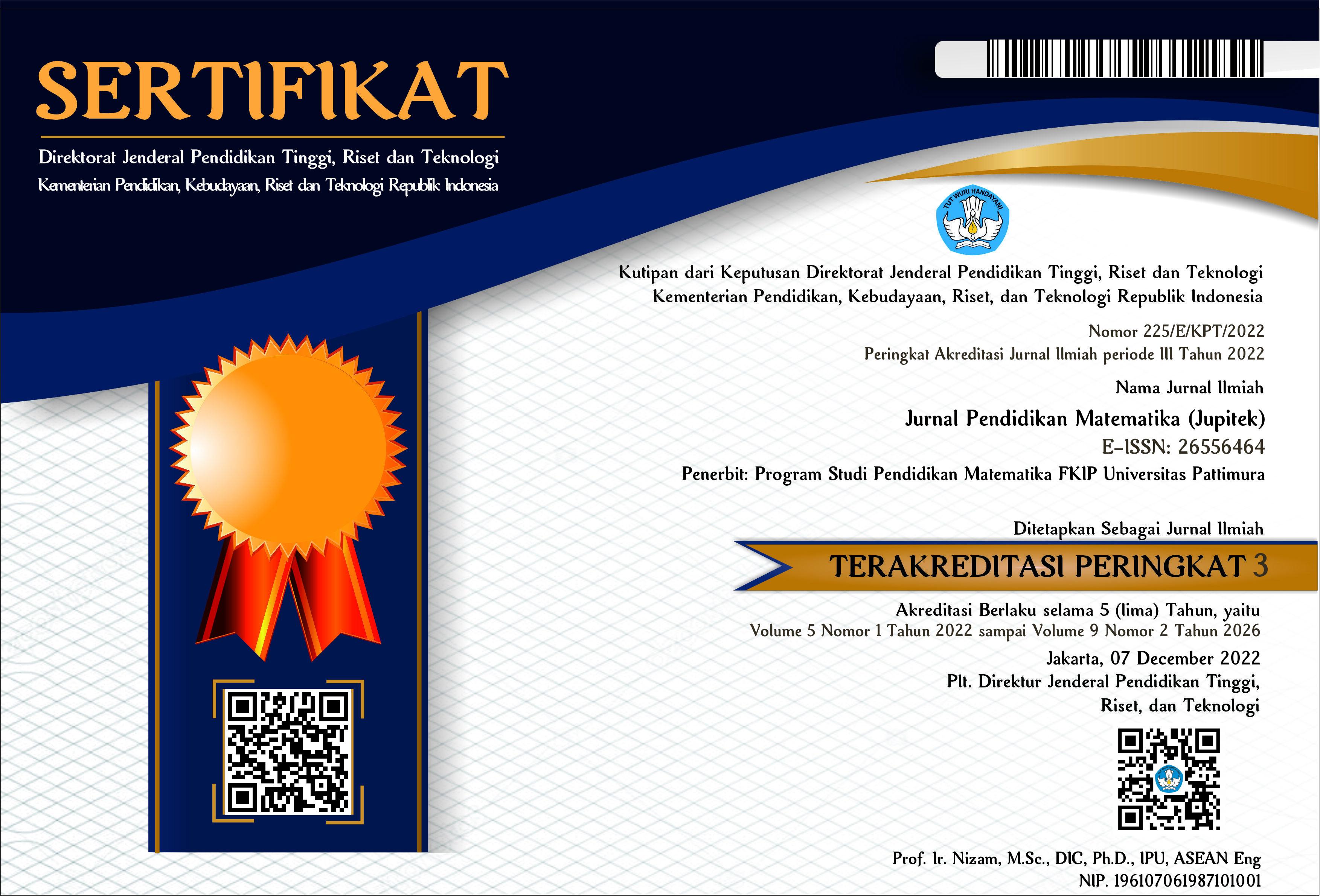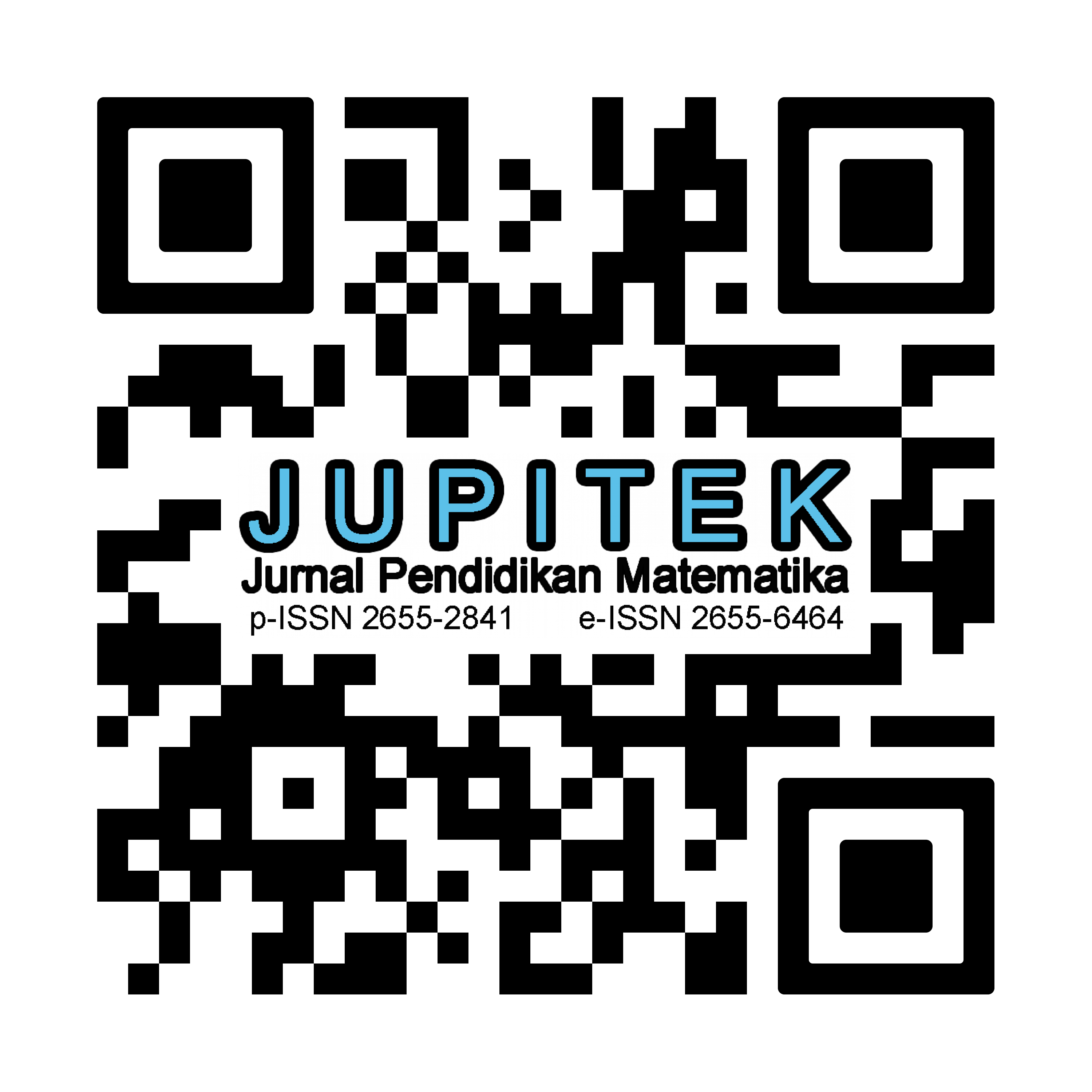ANALYSIS OF DIFFICULTIES OF MATHEMATICS EDUCATION STUDENTS IN BLENDED LEARNING AFTER COVID-19 PANDEMIC
Abstract
Entering the new normal era in the UINSU Medan, the campus has established a blended learning system as a learning method. Although blended learning is good as an alternative to learning method in the new normal era, it still had limitations. If viewed from the perspective of students, they have difficulties when took blended learning. This difficulty will certainly affect the learning outcomes of the students themselves. This of course cannot be left alone, it is necessary to in depth analysis of student difficulties when took blended learning and then find the right solution to solve these difficulties. This research focuses to find out students’ difficulties when taking Calculus Vector Class through blended learning method after COVID-19 pandemic era. This is a descriptive qualitative study. The subjects of this study are students of Calculus Vector class in the fourth semester of the Department of Mathematics Education, UINSU Medan. This research uses interview method and questionnaires as data collection instruments. The results show that students' difficulties are divided into technical difficulties, student adaptation difficulties, and lecturer adaptation difficulties. Learning strategies must be developed to address these difficulties and to bolster students’ adaptation to blended learning class
Downloads
References
Abdullah, W. (2018). Model Blended Learning dalam Meningkatkan Efektifitas Pembelajaran. FIKROTUNA, 7(1), 855–866. https://doi.org/10.32806/jf.v7i1.3169
Abu Amar. (2019). Konsep Dan Implikasi Makna Mengajar Dalam Perspektif Dosen. JURNAL CENDEKIA, 11(2), 125–136. https://doi.org/10.37850/cendekia.v11i2.94
Arianti, A. (2019). Urgensi Lingkungan Belajar Yang Kondusif Dalam Mendorong Siswa Belajar Aktif. DIDAKTIKA, 11(1), 41. https://doi.org/10.30863/didaktika.v11i1.161
Dewantara, J. A., & Nurgiansah, T. H. (2020). Efektivitas Pembelajaran Daring di Masa Pandemi COVID 19 Bagi Mahasiswa Universitas PGRI Yogyakarta. Jurnal Basicedu, 5(1), 367–375. https://doi.org/10.31004/basicedu.v5i1.669
Firman, M., & Hermansyah. (2020). Analisis Kesulitan Mahasiswa Pendidikan Matematika Dalam Pembelajaran Daring Pada Masa Pandemi Covid-19 [Preprint]. Open Science Framework. https://doi.org/10.31219/osf.io/4njwh
FITK. (2021). Buku Panduan Akademik Fakultas Ilmu Tarbiyah dan Keguruan UINSU Medan TA 2021/2022. FITK UINSU.
Habibi, A. (2020). Normal Baru Pasca Covid-19. Buletin Hukum dan Keadilan, 4(1), 8.
Ita, N., Anita, I., Hermawan, L., & Junaedi, D. (2020). Pemberdayaan Sekolah Merdeka Melalui Optimalisasi Penerapan Protokol Kesehatan dalam Upaya Sekolah Bebas Covid-19. Jurnal Pengabdian Tri Bhakti, 2(2), 183–190. https://doi.org/10.36555/tribhakti.v2i2.1683
Khaerunnisa, F. (2020). Evaluasi Penerapan Blended Learning Pada Pembelajaran Bahasa Arab di SMPIT IBadurrahma: Studi Kasus di Kelas VII Akhwat. ALSUNIYAT: Jurnal Penelitian Bahasa, Sastra, dan Budaya Arab, 2(2), 95–108. https://doi.org/10.17509/alsuniyat.v2i2.24808
Lawrence, N. (2016). Metodologi Penelitian Sosial: Pendekatan Kualitatif dan Kuantitatif, 7 ed. PT Indeks.
Maghfiroh, W. (2020). Dampak Teknologi Informasi (IT) terhadap Dunia Pendidikan. Prosiding Pascasarjana IAIN Kediri, 3, 14.
Moleong, L. J. (2014). Metode penelitian kualitatif edisi revisi. Bandung: PT Remaja Rosdakarya.
Ningsih, Y. L. (2016). Hasil Belajar Mahasiswa Melalui Penerapan Model Blended Learning Pada Mata Kuliah Persamaan DIfferensial. 11.
Pujiastuti, N. (2021). Strategi Dan Kebijakan Pemerintah Dalam Penanganan Covid-19 (Ditinjau Dari Dimensi Strategis Administrasi Publik). DEDIKASI, 22(2), 1. https://doi.org/10.31293/ddk.v22i2.5853
Puspitarini, D. (2022). Blended Learning sebagai Model Pembelajaran Abad 2. Ideguru : Jurnal Karya Ilmiah Guru, 7(1), 6.
Setyaningrum, A., Fatahillah, F., & Mardicko, A. (2021). Penggunaan Media Video Dalam Pembelajaran Daring Oleh Guru SD di Kecamatan Pagelaran Utara. Journal Of Elementary School Education (JOuESE), 1(2), 43–50. https://doi.org/10.52657/jouese.v1i2.1515
Sholichin, M., Zulyusri, Z., Lufri, L., & Razak, A. (2020). Analisis Kendala Pembelajaran Online Selama Pandemi Covid-19 Pada Mata Pelajaran IPA di SMPN 1 Bayung Lencir: (Analysis of the Obstacles of Online Learning During the Covid-19 Pandemic on IPA Subjects at SMPN 1 Bayung Lencir). BIODIK, 7(2), 163–168. https://doi.org/10.22437/bio.v7i2.12926
Staker, H., & Horn, M., B. (2012). Classifying K–12 Blended learning. Inno Sight Institut.
Syarif, I. (2012). Pengaruh Model Blended Learning Terhadap Motivasi dan Prestasi Belajar Siswa SMK. Jurnal Pendidikan Vokasi, 2, 16.
Syauqi, A. (2020). Jalan Panjang Covid 19 (Sebuah Refleksi Dikala Wabah Merajalela Berdampak Pada Perekonomian). Journal Keuangan dan Perbankan Syariah, 1(1), 19.
Wardani, D. N., Toenlioe, A. J. E., & Wedi, A. (2018). Daya Tarik Pembelajaran di Era 21 Dengan Blended Learning. JKTP : Jurnal Kajian Teknologi Pendidikan, 1(1), 6.
Widiara, I., K. (2018). Blended Learning Sebagai Alternatif Pembelajaran di Era Digital. Purwadita, 2(2), 50–56.
Yunus, N. R., & Rezki, A. (2020). Kebijakan Pemberlakuan Lock Down Sebagai Antisipasi Penyebaran Corona Virus Covid-19. SALAM: Jurnal Sosial Dan Budaya Syar-i, 7(3). https://doi.org/10.15408/sjsbs.v7i3.15083

Copyright (c) 2022 Suci Dahlya Narpila, Ammamiarihta Ammamiarihta, Siti Aminah Nababan

This work is licensed under a Creative Commons Attribution-NonCommercial-ShareAlike 4.0 International License.
License and Copyright Agreement
By submitting a manuscript to Jurnal Pendidikan Matematika (JUPITEK), the author(s) certify and agree to the following terms:
- Originality and Authority: The submitting author is authorized by all co-authors to enter into this agreement. The manuscript describes original work that has not been published previously in a peer-reviewed journal, nor is it under consideration for publication elsewhere.
- Approval: Its publication has been approved by all author(s) and by the responsible authorities of the institutions where the work was carried out.
- Rights: The authors secure the right to reproduce any material that has already been published or copyrighted elsewhere.
- Licensing and Copyright: Authors retain the copyright to their work.
- License Grant: The authors grant Jurnal Pendidikan Matematika (JUPITEK) the right of first publication, with the work simultaneously licensed under the Creative Commons Attribution-NonCommercial-ShareAlike 4.0 International (CC BY-NC-SA 4.0).
- Self-Archiving: Authors are permitted and encouraged to deposit the published version of their article in institutional repositories, on their personal websites, and other academic platforms, with proper acknowledgment of its initial publication in Jurnal Pendidikan Matematika (JUPITEK).





.png)


